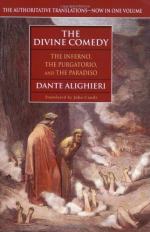For wisdom, to the end he might be king
Sufficient: not the number to search out
Of the celestial movers; or to know,
If necessary with contingent e’er
Have made necessity; or whether that
Be granted, that first motion is; or if
Of the mid circle can, by art, be made
Triangle with each corner, blunt or sharp.
“Whence, noting that, which I have said, and
this,
Thou kingly prudence and that ken mayst learn,
At which the dart of my intention aims.
And, marking clearly, that I told thee, ‘Risen,’
Thou shalt discern it only hath respect
To kings, of whom are many, and the good
Are rare. With this distinction take my words;
And they may well consist with that which thou
Of the first human father dost believe,
And of our well-beloved. And let this
Henceforth be led unto thy feet, to make
Thee slow in motion, as a weary man,
Both to the ‘yea’ and to the ‘nay’
thou seest not.
For he among the fools is down full low,
Whose affirmation, or denial, is
Without distinction, in each case alike
Since it befalls, that in most instances
Current opinion leads to false: and then
Affection bends the judgment to her ply.
“Much more than vainly doth he loose from shore,
Since he returns not such as he set forth,
Who fishes for the truth and wanteth skill.
And open proofs of this unto the world
Have been afforded in Parmenides,
Melissus, Bryso, and the crowd beside,
Who journey’d on, and knew not whither:
so did
Sabellius, Arius, and the other fools,
Who, like to scymitars, reflected back
The scripture-image, by distortion marr’d.
“Let not the people be too swift to judge,
As one who reckons on the blades in field,
Or ere the crop be ripe. For I have seen
The thorn frown rudely all the winter long
And after bear the rose upon its top;
And bark, that all the way across the sea
Ran straight and speedy, perish at the last,
E’en in the haven’s mouth seeing one steal,
Another brine, his offering to the priest,
Let not Dame Birtha and Sir Martin thence
Into heav’n’s counsels deem that they
can pry:
For one of these may rise, the other fall.”
CANTO XIV
From centre to the circle, and so back
From circle to the centre, water moves
In the round chalice, even as the blow
Impels it, inwardly, or from without.
Such was the image glanc’d into my mind,
As the great spirit of Aquinum ceas’d;
And Beatrice after him her words
Resum’d alternate: “Need there is
(tho’ yet
He tells it to you not in words, nor e’en
In thought) that he should fathom to its depth
Another mystery. Tell him, if the light,
Wherewith your substance blooms, shall stay with you
Eternally, as now: and, if it doth,
How, when ye shall regain your visible forms,
The sight may without harm endure the change,
That also tell.” As those, who in a ring
Tread the light measure, in their fitful mirth
Raise loud the voice, and spring with gladder bound;
Thus, at the hearing of that pious suit,
The saintly circles in their tourneying
And wond’rous note attested new delight.




